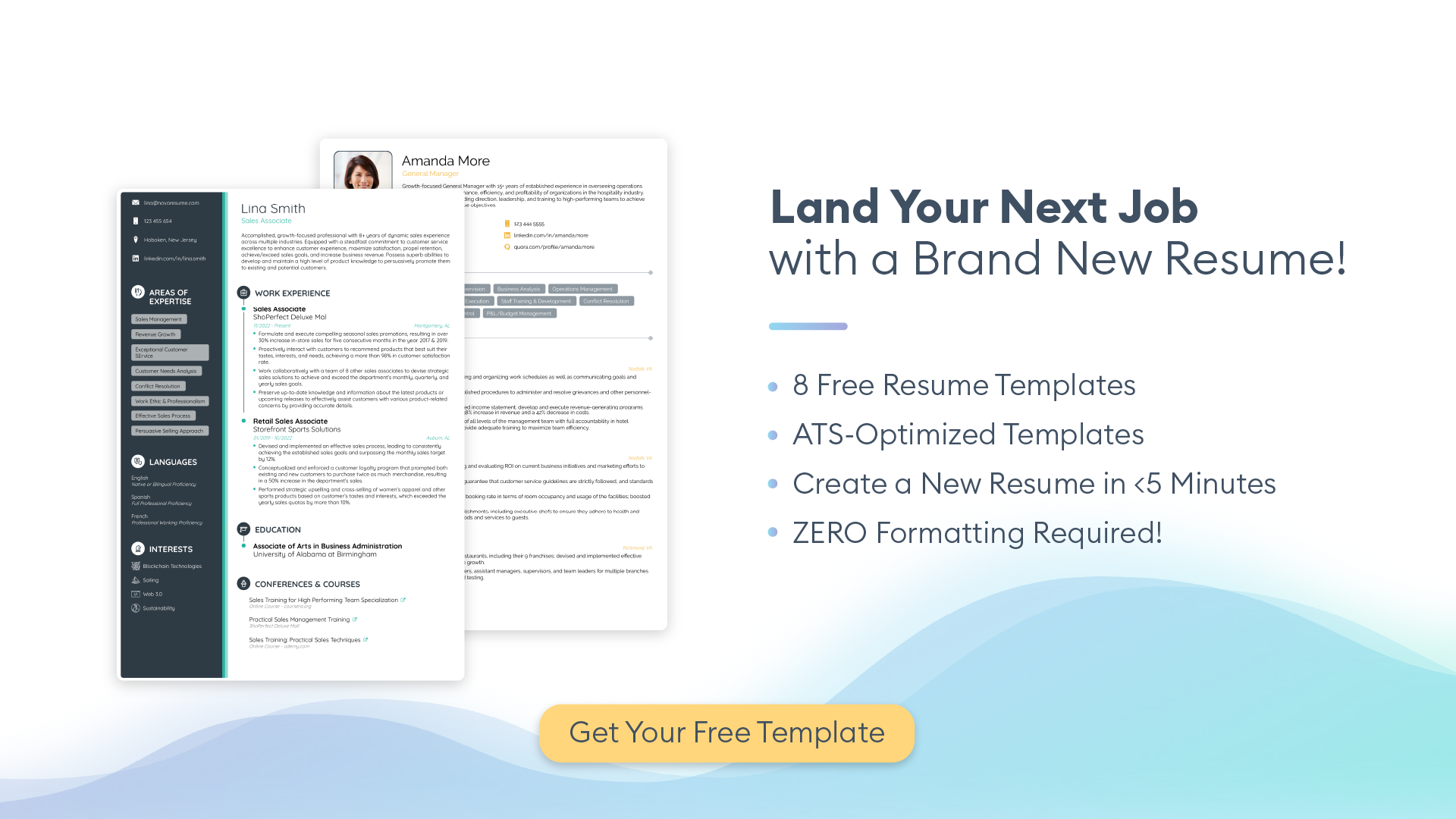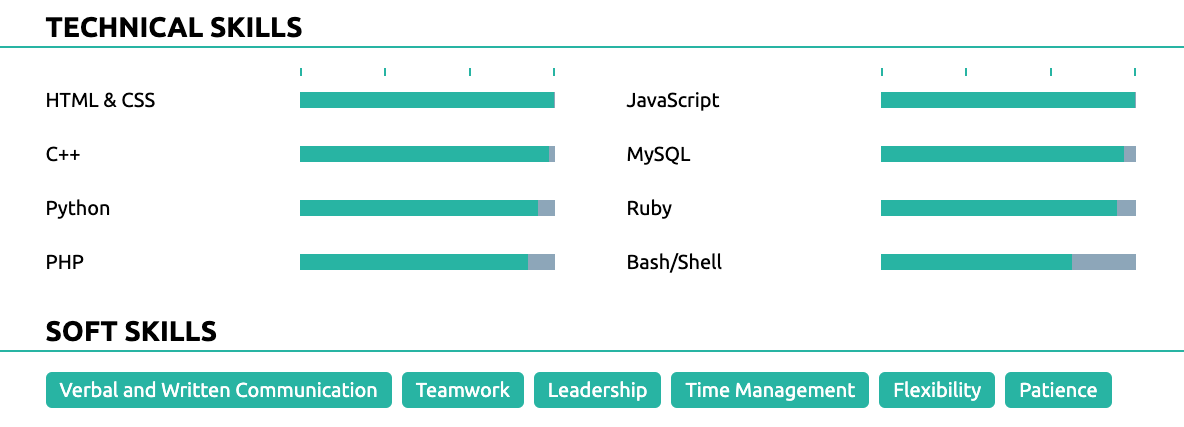33+ Synonyms to Describe Proficiency On Your Resume in 2026
Updated on 02/24/2026

You’re writing your resume, and you notice a pattern: you’re using a version of the word ‘proficient’ in every other line.
On one hand, you want to describe your strengths compellingly, but on the other hand, your vocabulary feels too limited.
Thankfully, this doesn’t have to be difficult. We’re here to help you navigate through this part of the resume writing process.
In this article, we’re going to cover:
- What Even Is Proficiency On Your Resume?
- Why Do You Need to Use Synonyms For It?
- 35 Alternative Words to Describe Your Proficiency
…and more!
Let’s get started.

Want to make your strengths pop and impress the hiring manager? Use our professional resume builder to create your resume in minutes!
Choose a resume template to get started.
What Is Proficiency on a Resume?
"Proficiency" on a resume refers to your level of skill or expertise in a particular area. It's how you communicate to employers that you can actually do what you’re claiming you can do.
When you say you're "proficient" in something, you're telling hiring managers that you have practical, working knowledge of that skill. You're not a beginner who needs extensive training, but you're also not claiming to be the world's leading expert.
Proficiency can apply to different areas on your resume, such as:
- Technical skills like software programs, programming languages, or equipment
- Language abilities and communication skills
- Industry-specific knowledge and procedures
- Soft skills like time management or leadership
Proficiency implies you can use these skills effectively in a work environment. You've moved beyond the learning phase, and you can apply your knowledge to solve problems and complete tasks on the job.
Why Do I Need to Use Synonyms?
Using synonyms in your resume won’t make it sound repetitive and boring.
Saying you’re "proficient" at something is fine. It’s a perfectly good word, but using it over and over makes your resume sound…well, unimaginative.
Hiring managers review dozens or even hundreds of resumes, so you need to capture their attention in under ten seconds. Anything that sounds monotonous and boring will just blend into the background and work against your application.
Not to mention it shows limited vocabulary and erodes your credibility. If you’re proficient at everything in your resume, the employer can’t tell how true that is. You should be able to describe your skills more dynamically if you possess them.
And finally, spicing up your vocabulary helps with keyword optimization. Different job ads use different terms to describe the same skills. If you use synonyms for proficiency, you increase your chances of matching the specific language that employers and applicant tracking systems are looking for.
💡
Pro Tip:
New to resume writing? Learn how to make a resume with our detailed beginner’s guide!
35 Synonyms for Proficiency
Now that you know what proficiency is all about, let’s get into what other words you can use to expand your resume’s vocabulary.
To make things easier, we’ve divided them by approximate skill levels, starting with:
Basic
As the name suggests, this level of proficiency is for people who are just getting started on their career path.
- Beginner. Use this when you're honest about being new to a skill but eager to learn. It works well for entry-level positions where employers expect training.
- Conversant. This sounds a bit complicated, but it means you understand the topic well enough to discuss it intelligently and follow conversations about it, even if you don’t have extensive hands-on experience.
- Trained. The word shows you've received formal instruction or completed specific coursework. It carries some weight because it implies structured learning.
- Familiar. Suggests basic awareness and some exposure. Use it sparingly and only when you genuinely understand the fundamentals.
- Practiced. This comes with the repeated application of a skill and shows you've moved beyond theory into actual use.
Let’s look at some in-context examples for a beginner illustrator’s resume:
Correct Example
- Trained in Adobe Illustrator through university coursework, creating 15+ vector illustrations for a student publication with consistent brand guidelines.
- Familiar with typography principles, successfully selecting fonts for 5 client logos that improved brand recognition by 40%.
- Practiced in color theory application, developing cohesive palettes for 10+ design projects that received positive client feedback.
Incorrect Examples:
- Proficient in Adobe Illustrator.
- Proficient in design software and creative work.
- Proficient in color theory and client communication.
Intermediate
This next case is where the word “proficient” gets passed around the most. When you’re better than a beginner but short of an expert, you’re at the intermediate plateau.
This is typically the most common skill level, so we’ve divided it into two sub-levels:
First, the lower-intermediate synonyms for proficiency:
- Capable. Shows you can handle tasks independently and produce reliable results. It's a solid, trustworthy word that employers appreciate.
- Competent. Indicates you meet the standard requirements for the role and can perform duties effectively without constant supervision.
- Qualified. Perfect when you have the credentials, education, or experience that formally prepare you for the position.
- Knowledgeable. Emphasizes your understanding of concepts, processes, or industry-specific information rather than just technical skills.
- Skilled. A straightforward word that shows you've developed real ability through practice and experience.
Now, let’s see what a resume objective would look like at this level:
Correct Example
Recent Communications graduate seeking a Secretary position at XYZ Inc. Capable of managing multiple calendars and coordinating meetings for teams of 10+ members, with skilled written communication demonstrated through 15+ published articles in the university newsletter.Incorrect Example:
Recent Communications graduate seeking a Secretary position. Proficient in office management and communication skills.
Now, let’s look at the upper-intermediate words you can use if you’re a more seasoned professional:
- Experienced. Case in point, this shows you spent substantial time working with a skill and applied it successfully across different situations.
- Adept. This suggests a natural ability combined with practice. It implies you can handle complex tasks and adapt to new challenges within that skill area.
- Proficient. The classic term still indicates solid, reliable competence. Use it when you want to be straightforward about your abilities without overselling.
- Well-versed. Sometimes shortened to just “versed,” this emphasizes deep knowledge and familiarity with all aspects of a subject and its nuances.
- Fluent. Perfect for languages, software, or processes where smooth, effortless execution is important. It shows mastery of fundamentals and an intuition for the rest.
- Professional. Indicates you can perform at industry standards and handle any necessary responsibilities with this skill.
Here’s an example with a data analyst’s resume summary:
Correct Example
Experienced data scientist with 10+ years, adept at delivering valuable insights via advanced analytics for Fortune 500 CEOs and VPs. Well-versed in statistical models, algorithms, and multivariate analysis, with professional expertise in Python and R programming that improved decision-making accuracy by 35%.Incorrect Example
Proficient data scientist with experience working with executives. Proficiency in statistical analysis and data modeling tools.
Advanced
You’re pretty much at the top of your class – you can say you’re advanced. This is just past intermediate, but before expert territory:
- Highly-Skilled. Emphasizes an exceptional ability that goes beyond competence. Use this when you consistently deliver amazing results.
- Advanced. A straightforward way to say you're operating at a high level with complex tasks and you can handle sophisticated challenges.
- Accomplished. This shows you've achieved notable results and have a track record of success. Perfect when you have specific achievements to highlight.
- Talented. Suggests a natural ability combined with a developed skill. A good choice when you want to emphasize both your aptitude and performance.
- Seasoned. This classy word indicates extensive experience with the wisdom gained over time. It shows you've been through different situations and learned from them.
- Versatile. Use this to demonstrate adaptability and the ability to apply skills across different contexts or handle multiple responsibilities effectively.
The certifications on your resume are a great place to back up your advanced skills.
Correct Example
- Advanced Google Analytics Certified Professional
Google, March 2024Skills acquired: Accomplished in conversion tracking, audience segmentation, and custom reportingIncorrect Example
- Google Analytics Certified Professional
Google, March 2024Skills acquired: Proficient in analytics and reporting
Expert
Once you’re seriously good at what you do, to the point that you show others the theory and flawless practical application, you’re an expert. You may even have a relevant degree or a license to teach what you’re proficient in.
- Expert. The gold standard term that shows mastery and deep knowledge. Use when you truly have those top-tier skills that others recognize and look for.
- Specialist. Shows focused expertise in a specific area or niche. It’s perfect when you've dedicated significant time to becoming the go-to person for particular tasks or knowledge.
- Authority. Indicates that others look to you for guidance and decisions in this area. Use it when you're recognized as a leader or final decision-maker in your field.
- Masterful. Sometimes just “master,” this suggests exceptional skill combined with artistry or finesse. It’s best used when your work consistently exceeds expectations and even demonstrates sophistication.
- Exceptional. It’s a little showy, but it emphasizes that your abilities stand out significantly from the norm. Use it when you have measurable proof that your performance surpasses industry standards.
- Command. This word shows complete control and understanding of a subject. It indicates you can handle any situation or challenge within that skill area with confidence.
- Expertise. Use it to highlight your specialized knowledge. It’s perfect for emphasizing the depth of your understanding in specific technical or professional areas, whether it’s computer skills or conflict resolution.
- Credentialed. This goes for formal recognition of your expertise through certifications, licenses, or professional designations. It’s meant to validate your skills to both employers and peers.
Since you’re basically a ten-out-of-ten master of whatever it is you do, you can just visualize it by adding bars next to the skills of your choice, as such:

The hiring manager will rightfully assume you’re a masterful Java developer.
Specialized
After these level-specific synonyms for proficiency, it’s time to look at some that work best in certain contexts or industries.
These words just have specific connotations, so they’re ideal for certain types of skills or professional situations. They won’t fit on every resume, and they can sound out of place if you don’t use them appropriately.
- Adroit. This fancy word suggests cleverness and skill in handling difficult or delicate situations. It’s best used for interpersonal skills, negotiations, or problem-solving.
- Aptitude. Indicates a natural talent or inclination toward a particular skill. It’s perfect for highlighting innate abilities or when you've quickly mastered something that typically takes others longer to learn.
- Dexterity. Originally referring to physical skill, this also applies to mental agility and skillful handling of complex tasks. It works well for technical roles, surgery, craftsmanship, or multitasking abilities.
- Finesse. This is where refined skill and subtle expertise meet. Use it when your approach demonstrates sophistication, diplomacy, or artistic sensibility in your work.
- Ingenuity. The word highlights creative problem-solving and innovative thinking. It’s ideal for roles that require innovative solutions, engineering challenges, or situations where conventional approaches don't work.
These words are more complex, and we recommend leaving them for your cover letter. That way, you can provide more context and weave them in naturally if it matches your overall tone.
Let’s look at some examples:
Correct Example:
- In my previous role, I demonstrated adroit negotiation skills when mediating between conflicting departments, successfully resolving budget disputes that had stalled three major projects for over two months.
- My natural aptitude for data visualization became evident when I taught myself Tableau in just two weeks and created dashboards that our senior analysts had been struggling to build for months.
- The role requires dexterity in managing multiple client accounts simultaneously, which aligns perfectly with my experience juggling 15+ projects while maintaining 98% client satisfaction rates.
Incorrect Examples:
- I am proficient in negotiation and conflict resolution.
- I am proficient in learning new software quickly.
- I am proficient in managing multiple projects and maintaining client satisfaction.
7 Tips to Describe Proficiency On Your Resume
Now that you understand what proficiency is and what synonyms to use for it, you need to apply it to your resume.
Here are some resume tips to make your skills stand out to hiring managers:
- Assess yourself accurately. Be honest about your actual skill level instead of exaggerating. This is going to help you during interviews and prevent awkward situations down the line.
- Keep them relevant. Don't mention your Adobe Creative Suite skills when you’re applying for an accounting position. Tailor any descriptions of your skill proficiencies to match what the employer is actually looking for.
- Be specific. Avoid vague phrases like "familiar with" or "some knowledge of." Use precise terms that clearly state your skill level, whether that’s “basic,” "intermediate," "advanced," or "expert-level."
- Use examples. Instead of just saying you’re "proficient in project management," describe how you "managed a 15-person team to deliver a software launch 2 weeks ahead of schedule." Concrete examples give you credibility and make you memorable.
- Show them visually. Consider using skill bars, percentage ratings, or proficiency scales to give hiring managers a quick visual reference of where your abilities are.
- Use action verbs. Write "developed" instead of "responsible for developing" and "optimized" rather than "helped optimize." Strong action verbs make your accomplishments sound more impressive and direct.
- Mention them throughout your resume. Don't limit describing your know-how to your work experience or skill sections. Include them in your resume summary, education, certifications, and personal projects sections to create a comprehensive picture throughout your entire resume.
FAQs About Proficiency On Your Resume
Do you still have some questions about proficiency on your resume? Check out these answers to the most frequently asked questions below:
Yes, soft skills belong on your resume. Employers need people with interpersonal abilities like communication, teamwork, and problem-solving just as much as technical skills. Most jobs require some collaboration and client interaction, so soft skills are crucial.
But don't just make a generic list. Like with hard skills, demonstrate them through your accomplishments. For example, "led cross-functional team meetings that improved project delivery time by 25%,” reads a lot better than “excellent communication skills.”
Just tailor your resume’s soft skills to the specific role you're applying for. A sales position needs relationship-building more than Photoshop or baking skills.


